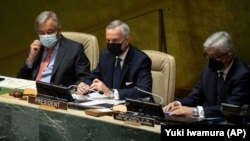After weeks of negotiations as part of a review of the treaty that remains the cornerstone of the nuclear nonproliferation regime, the Russian government decided to block consensus on a final document at the conclusion of the Tenth Review Conference of the Nuclear Non-Proliferation Treaty, or NPT.
Russia refused to accept a document that included a call for the return of control at the Zaporizhzhia Nuclear Power Plant to “competent Ukrainian authorities.” Of the nearly 150 participating countries, Russia was the only one that objected to the outcome document, which included language on nuclear risk reduction, expanding the peaceful uses of nuclear energy, and many other important issues.
However, despite Russian obstructionism, NPT Parties affirmed the need for action on arms control, proliferation crises, and expanded access to peaceful nuclear energy, science, and technologies, especially among states of the southern hemisphere. Amid a challenging international political and security environment, the extent to which NPT Parties found common ground in support of strengthening the nuclear nonproliferation regime is remarkable, noted State Department deputy spokesperson Verdant Patel.
Meanwhile, for the Russian government not to accept such language in the face of overwhelming international consensus underscores the need to press Russia to end its military activity near the power plant and return control of it to Ukraine, said U.S. State Department deputy spokesperson Patel. The Zaporizhzhia Nuclear Power Plant, or ZNPP, is the largest nuclear power plant in Europe, and has been held by Russian forces since March.
Despite Russia’s cynical obstructionism, the fact that all the other countries participating in the Conference were able to support the final document speaks to the Treaty’s enduring and essential role in preventing nuclear proliferation and averting the danger of nuclear war.
The United States will continue to work with the international community to achieve the peace and security of a world without nuclear weapons. The NPT is and will remain the fundamental cornerstone of the nuclear nonproliferation regime and essential to advancing nuclear disarmament and the peaceful uses of nuclear energy.
“We are proud to have worked constructively and in good faith with all Parties toward a consensus,” declared Deputy spokesperson Patel. “Russia’s actions reflect only on Russia. It is clear that the rest of the NPT’s States Parties recognize the Treaty’s role as an essential pillar of the international rules-based order.”
The Russian government blocked consensus on a final document at the conclusion of the Tenth Review Conference of the Nuclear Non-Proliferation Treaty.






